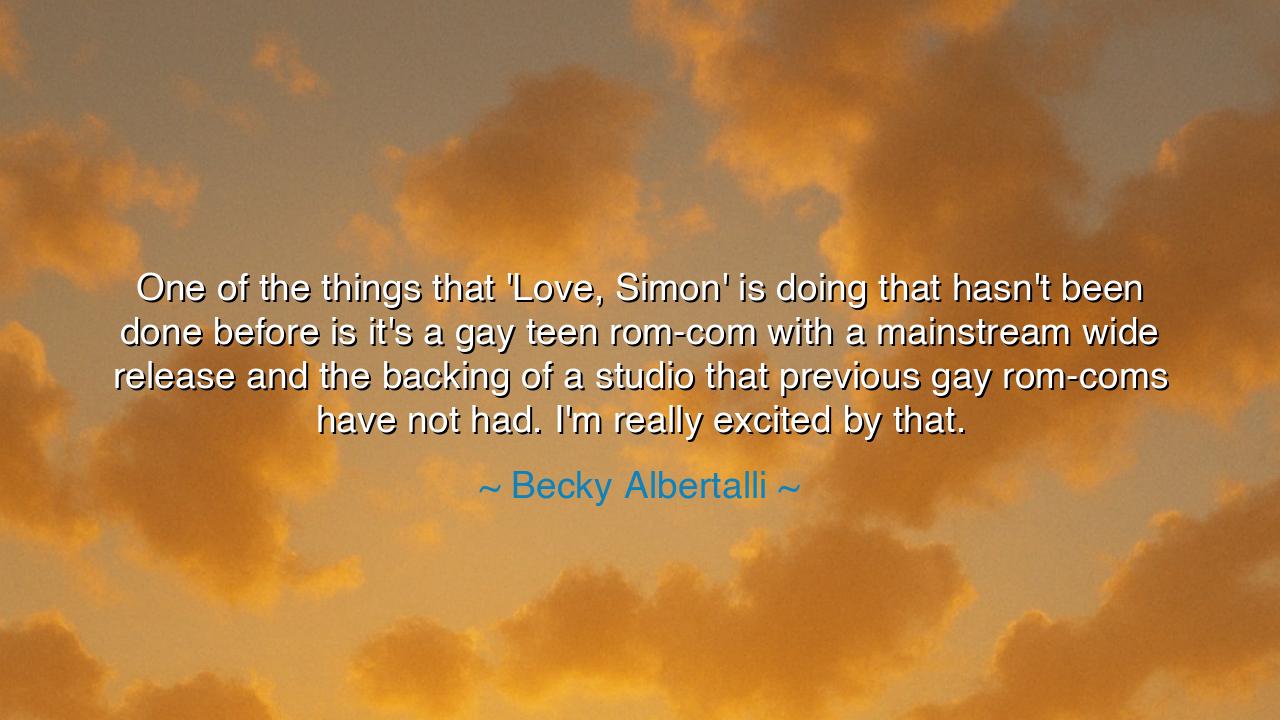
One of the things that 'Love, Simon' is doing that hasn't been
One of the things that 'Love, Simon' is doing that hasn't been done before is it's a gay teen rom-com with a mainstream wide release and the backing of a studio that previous gay rom-coms have not had. I'm really excited by that.






When Becky Albertalli declared, “One of the things that ‘Love, Simon’ is doing that hasn’t been done before is it’s a gay teen rom-com with a mainstream wide release and the backing of a studio that previous gay rom-coms have not had. I’m really excited by that,” she spoke with the fervor of one who has witnessed a door open where for centuries only walls stood. Her words capture the essence of progress: the joy of seeing voices once confined to the margins now carried proudly onto the great stage of culture.
The origin of this truth lies in the long history of love stories told only one way. For decades, the romantic comedy was a cherished genre, but it was also narrow, filled with familiar faces and familiar pairings. Those whose loves fell outside of tradition were denied the magic of seeing themselves as the central figures of laughter, longing, and triumph. Instead, they were cast in shadows, treated as side characters or reduced to jokes. In proclaiming the significance of ‘Love, Simon,’ Albertalli points to the breaking of this cycle: here, at last, was a story that offered representation, not as novelty, but as norm.
Consider the power of what she describes: a gay teen rom-com not hidden in small festivals or whispered in arthouse theaters, but delivered with the backing of a studio, shown on thousands of screens, accessible to millions. This is not a minor detail. It is the difference between living in a hidden room and standing in the sunlight. For what the studio gave was not only distribution, but legitimacy. To release such a film widely was to declare to the world: this love is worthy of laughter, this longing is worthy of music, this story is worthy of the same joy that countless straight romances have always enjoyed.
History has shown us the power of such turning points. When Jackie Robinson stepped onto the baseball field, it was not the first time a Black man had played the game, but it was the first time the doors of the mainstream were thrown open with the authority of institutions. The effect was seismic, not only for sport but for the consciousness of a nation. In the same way, ‘Love, Simon’ was not the first queer love story, but it carried with it the thunder of institutional recognition, and thus it shifted culture’s gaze.
Albertalli’s excitement is not merely personal—it is prophetic. She recognizes that the teen audience, at its most vulnerable, hungry to see themselves in stories, would for the first time see a reflection that was not hidden or shamed. To a young queer person, to sit in a theater filled with friends, strangers, and family, and to watch a love story where the hero looks like them, desires like them, and is celebrated like them—this is not entertainment, but salvation. Such a moment reshapes the soul, whispering: you, too, are worthy of joy.
The lesson here is eternal: representation is not decoration, it is liberation. To place a marginalized story at the center is to give its people permission to exist in fullness. It is to declare that their laughter is as sweet, their love as real, their stories as universal as any others. And once the culture begins to see this, it cannot unsee it. The crack in the wall becomes a doorway, and the doorway leads to a new world.
Practical wisdom flows from this. Support the stories that expand the circle of humanity. Do not wait for institutions to decide their worth—raise your voice, spend your money, share your praise, and demand that all people see themselves reflected in the art of their age. If you are a creator, write boldly and unapologetically the truths of your people. And if you are an audience member, know that your presence in the theater is not small—it is part of the chorus that tells the industry: this story matters.
Thus Becky Albertalli’s words must be remembered as more than a celebration of one film. They are a marker of cultural turning, a reminder that art can carry us closer to justice. ‘Love, Simon’ was not simply a movie; it was a declaration. It proved that the gay teen rom-com was not only possible but beautiful, not only niche but universal. And so the wisdom to pass down is this: cherish the stories that bring the hidden into the light, for in them the dignity of all humanity is restored.






AAdministratorAdministrator
Welcome, honored guests. Please leave a comment, we will respond soon